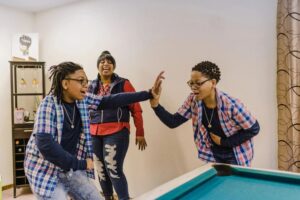
Self-Efficacy – How We Can, Not Why We Can’t
The title of this blog post comes from a Ted Talk by Peter Sage. I'll link to the video below so you can watch it yourself. In the video, Sage talks about the incredibly limiting impact of self doubt. A quote of his I really liked is "You will never rise above your own opinion of yourself." It made me think of the power of self-efficacy and hope. I wrote a post about Psychological Capital that talks more about these.
 Self-efficacy has to do with our own belief about our skills and abilities to bring about change. It is related to hope, but while hope is more about the pathway to our goal, self-efficacy is our belief about our ability to achieve that goal. No matter how much hope we have and no matter how much agency or true skill we have, if we don't believe we can succeed, we likely won't. We limit ourselves everyday by setting our expectations low and expecting not to succeed beyond that.
Self-efficacy has to do with our own belief about our skills and abilities to bring about change. It is related to hope, but while hope is more about the pathway to our goal, self-efficacy is our belief about our ability to achieve that goal. No matter how much hope we have and no matter how much agency or true skill we have, if we don't believe we can succeed, we likely won't. We limit ourselves everyday by setting our expectations low and expecting not to succeed beyond that.
In a Ted Talk, Peter Sage (2017) argues that all this happens in the unconscious - in other words, it is automatic and often beyond our awareness. He makes a vivid analogy, arguing that if you are a hard working ant running north as fast as you can but you are on the back of an elephant running south, you are not moving in the direction you think you are. You are the hard working ant pointed north, but all your negativity, self-doubt, bad habits, pessimism, and past trauma is pointing south.
So how do we slow down the elephant? Or better yet, how do we get off? Looking at what is preventing us from moving forward is obviously important. 'Why we can't' is important, but only if this information is used for some purpose. Seligman has said that the elimination of disease (in medical terms) or disorders are like weeding a garden. It creates a place for forward movement, a place for seeds to be planted and to grow.
But focusing on 'how we can' is what actually moves us forward. Adding this strength focus allows us to move beyond weeding the garden and toward growing beautiful roses. Along with looking at the past, or what is holding us back from optimal growth, we also need to look at the present and future. While it is important to explore our problems, it is equally important to explore solutions.
 How do we do this? First, a focus on strengths and other resources like our VIPs [Very Important People/Pets] (these are the seeds that we need to nourish). Sage argues that we should monitor what we allow to go in and out of our belief system - be careful what seeds you plant. If you surround yourself with people who put you down, you eventually internalize that and begin to believe it. If you surround yourself with bad news or negative stories, you adapt to this bleak outlook. Negativity and self-doubt become a habit and significant obstacles without us having to do anything. It happens all by itself - these negative seeds grow like weeds.
How do we do this? First, a focus on strengths and other resources like our VIPs [Very Important People/Pets] (these are the seeds that we need to nourish). Sage argues that we should monitor what we allow to go in and out of our belief system - be careful what seeds you plant. If you surround yourself with people who put you down, you eventually internalize that and begin to believe it. If you surround yourself with bad news or negative stories, you adapt to this bleak outlook. Negativity and self-doubt become a habit and significant obstacles without us having to do anything. It happens all by itself - these negative seeds grow like weeds.
The goal is to plant the right seeds and to nourish them so they grow - to let the stuff in that helps, and block the stuff that doesn't. This means amplifying your strengths, activating your resources, and engaging with your VIPs. Letting in the good, blocking the bad help us moving forward. But we also need to get rid of all the junk that already got in. Weeding is an ongoing process as those pesky weeds have a way of sneaking in and growing like mad. Self-help activities can be incredibly useful but also consider coaching, counseling, of psychotherapy to help get that bad stuff out, especially if you are dealing with trauma or other issues that are having a significant negative impact on you.
 Now, start making a change in what else gets in. Be purposeful and intentional. Be consistent and persistent. Think about who motivates you, who inspires you to be better, to think more positively - these are the people you want more of in your life. Engage with these people. Those who bring you down, who make you feel bad about yourself or the world - those are the people you need less of. Try to disengage with these people if possible or find a way to avoid their negativity. Since many people have both positive and negative impacts on us (as we do on others), work to build on positive interactions and reduce the negative ones.
Now, start making a change in what else gets in. Be purposeful and intentional. Be consistent and persistent. Think about who motivates you, who inspires you to be better, to think more positively - these are the people you want more of in your life. Engage with these people. Those who bring you down, who make you feel bad about yourself or the world - those are the people you need less of. Try to disengage with these people if possible or find a way to avoid their negativity. Since many people have both positive and negative impacts on us (as we do on others), work to build on positive interactions and reduce the negative ones.
Also consider what you watch on TV, what you read, what you pay attention to when you are interacting with the world - if it brings you down, stop doing it, or at least do less of it - if it builds you up, do more of it. This is a basic tenet of Solution-Focused Therapy and it works really well in creating new habits. It does take some practice before it becomes a habit so stick with it. And the last point... remember that weeds have a way of returning and overtaking. You need to be vigilant.
So here is the video. I hope this post and the video inspire you to look more for what grows your garden. I hope it helps you look less at why you can't and more ay how you can.
References
Sage, P. (2017). How to eliminate self-doubt & the power of your unconscious mind. Retrieved from https://www.youtube.com/watch?v=v1ojZKWfShQ.